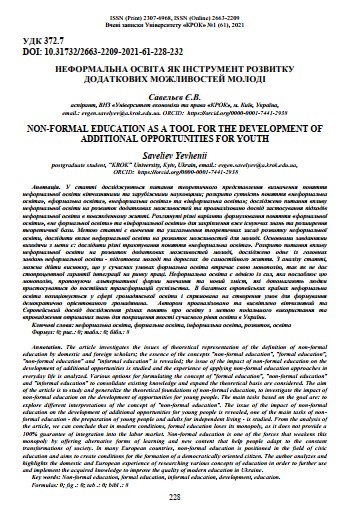NON-FORMAL EDUCATION AS A TOOL FOR THE DEVELOPMENT OF ADDITIONAL OPPORTUNITIES FOR YOUTH
DOI:
https://doi.org/10.31732/2663-2209-2021-61-228-232Keywords:
Non-formal education, formal education, informal education, development, educationAbstract
The article investigates the issues of theoretical representation of the definition of non-formal education by domestic and foreign scholars; the essence of the concepts "non-formal education", "formal education", "non-formal education" and "informal education" is revealed; the issue of the impact of non-formal education on the development of additional opportunities is studied and the experience of applying non-formal education approaches in everyday life is analyzed. Various options for formulating the concept of "formal education", "non-formal education" and "informal education" to consolidate existing knowledge and expand the theoretical basis are considered. The aim of the article is to study and generalize the theoretical foundations of non-formal education, to investigate the impact of non-formal education on the development of opportunities for young people. The main tasks based on the goal are: to explore different interpretations of the concept of "non-formal education". The issue of the impact of non-formal education on the development of additional opportunities for young people is revealed, one of the main tasks of non-formal education - the preparation of young people and adults for independent living - is studied. From the analysis of the article, we can conclude that in modern conditions, formal education loses its monopoly, as it does not provide a 100% guarantee of integration into the labor market. Non-formal education is one of the forces that weakens this monopoly by offering alternative forms of learning and new content that help people adapt to the constant transformations of society. In many European countries, non-formal education is positioned in the field of civic education and aims to create conditions for the formation of a democratically oriented citizen. The author analyzes and highlights the domestic and European experience of researching various concepts of education in order to further use and implement the acquired knowledge to improve the quality of modern education in Ukraine.
Downloads
References
Андрущенко В. Філософія неформальної освіти: проблеми та перспективи розвитку.
Перспективи впровадження інноваційних форм освіти в Україні. Національний інститут стратегічних досліджень URL : http://www.niss.gov.ua/articles/2665.
Рекомендації Асамблеї Ради Європи 1437 Про неформальну освіту. 2000. URL : http/coe.kiev.ua/ bul/ bul9/text30htm.
Закон України «Про освіту». URL : https://zakon.rada.gov.ua/laws/show/2145-19#Text.
Неформальна освіта як важливий елемент безперервної освіти. URL : http://javoriv-rda.gov.ua/osvita/neformalna-osvita-yak-vazhlyvyj-element-bezperervnoji-osvity/
Неформальна освіта як інструмент підвищення лідерського потенціалу учнів ПТНЗ. URL : https://elibrary.kubg.edu.ua/id/eprint/23725/1/T_Zhuravel_Y_Rogozna_PLP_SPSR_IL.pdf.
Неформальна освіта: теоретичні аспекти та наукові підходи. URL : https://journals.indexcopernicus.com/api/file/viewByFileId/335421.pdf.
Роль неформальної освіти у сучасному суспільстві. URL : http://iqholding.com.ua/articles/rol-neformalno%D1%97-osv%D1%96ti-u-suchasnomu-susp%D1%96lstv%D1%96.



